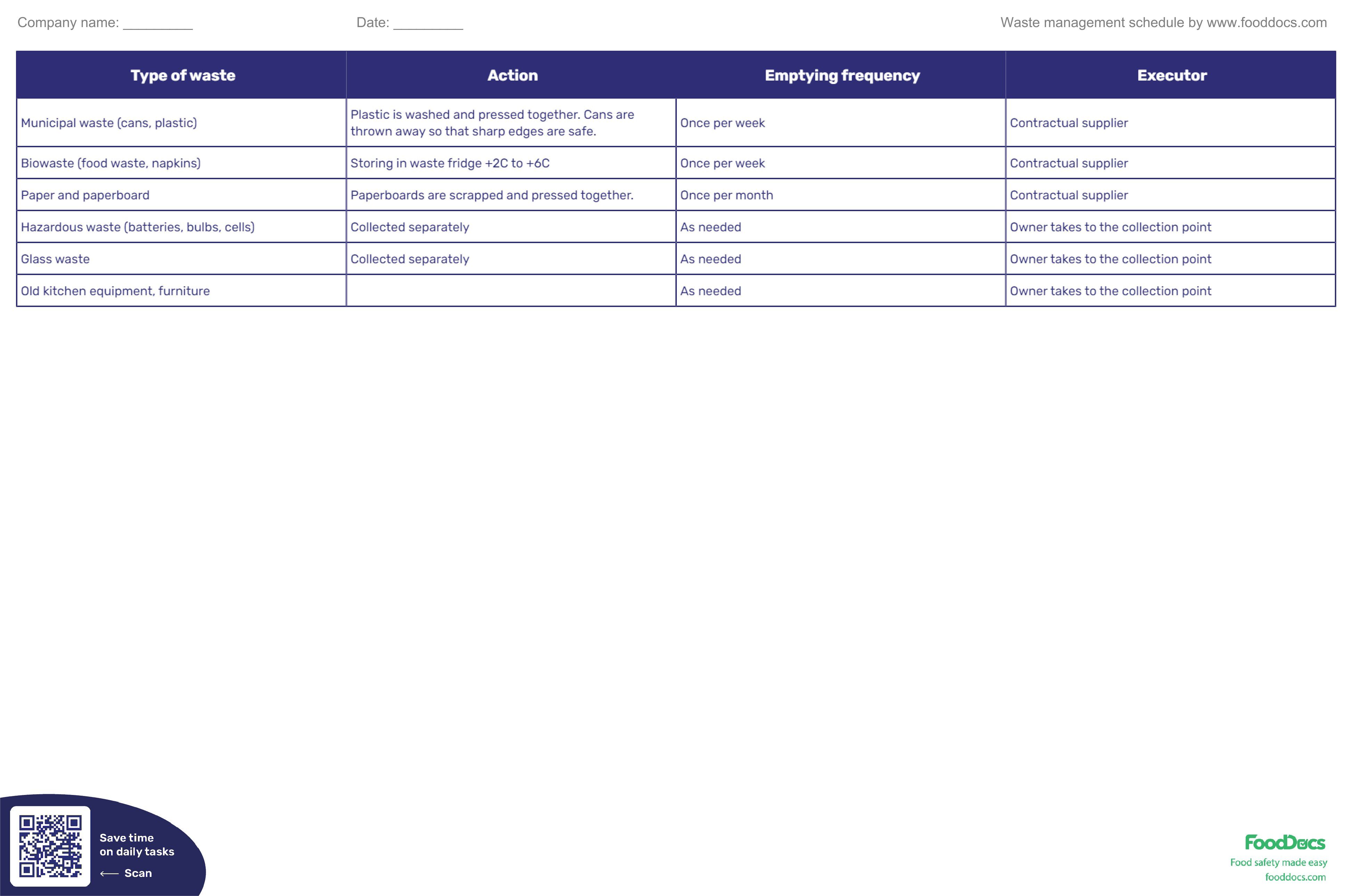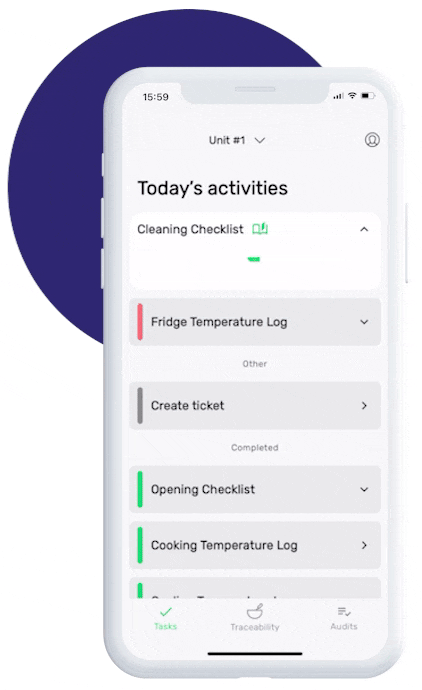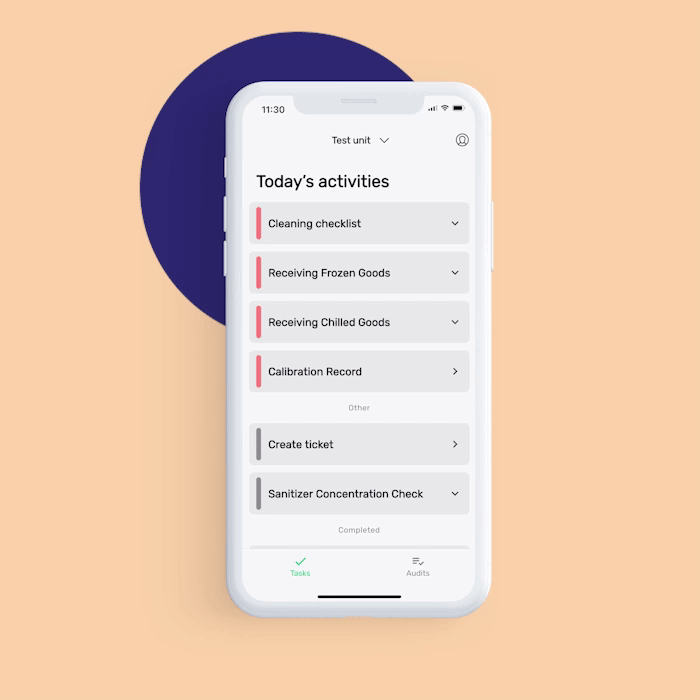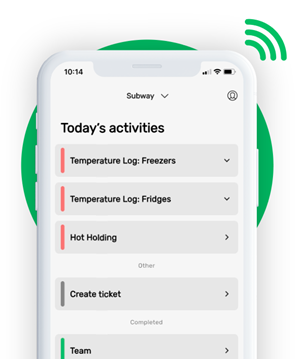WASTE MANAGEMENT SCHEDULE | FREE TEMPLATE



This is how our Digital Food Safety platform saves 20% of your time on daily tasks:
- Get upcoming task notifications
- Add data into the app
- Check the status of tasks in real-time

When food safety was still handled on paper, I typically spent a couple of hours per day getting the papers and going around checking or completing tasks… Now I can sit down and it's just all there in one place. It takes me 5-10 minutes.
Ruth B.
Store Manager
| Type of waste | Action | Emptying frequency | Executor | |
|---|---|---|---|---|
| Municipal waste (cans, plastic) | Plastic is washed and pressed together. Cans are thrown away so that sharp edges are safe. | Once per week | Contractual supplier | |
| Biowaste (food waste, napkins) | Storing in waste fridge +2C to +6C | Once per week | Contractual supplier | |
| Paper and paperboard | Paperboards are scrapped and pressed together. | Once per month | Contractual supplier | |
| Hazardous waste (batteries, bulbs, cells) | Collected separately | As needed | Owner takes to the collection point | |
| Glass waste | Collected separately | As needed | Owner takes to the collection point | |
| Old kitchen equipment, furniture | As needed | Owner takes to the collection point |
| Type of waste | Municipal waste (cans, plastic) | |
| Action | Plastic is washed and pressed together. Cans are thrown away so that sharp edges are safe. | |
| Emptying frequency | Once a week | |
| Executor | Contractual supplier | |
| Type of waste | Biowaste (food waste, napkins) | |
| Action | Storing in waste fridge +2C to +6C | |
| Emptying frequency | Once a week | |
| Executor | Contractual supplier | |
| Type of waste | Paper and paperboard | |
| Action | Paperboards are scrapped and pressed away. | |
| Emptying frequency | Once a month | |
| Executor | Contractual supplier | |
| Type of waste | Hazardous waste (batteries, bulbs, cells) | |
| Action | Collected separately | |
| Emptying frequency | As needed | |
| Executor | Owner takes to the collection point | |
| Type of waste | Glass waste | |
| Action | Collected separately | |
| Emptying frequency | As needed | |
| Executor | Owner takes to the collection point | |
| Type of waste | OLED kitchen equipment, furniture | |
| Action | - | |
| Emptying frequency | As needed | |
| Executor | Owner takes to the collection point |
Key points from this article
- A waste management schedule is a structured plan that outlines the processes for handling, storing, and disposing of waste within a food business.
- Some things it specifies are the type of waste, what actions are required, how often that action needs to happen, and who's responsible for it.
- Effective waste management schedules reduce risk of contamination to maintain food safety compliance.
- Any food business handling food — perishable or otherwise — requires a waste management schedule including restaurants, food processors, catering companies, and grocery stores.
- Four benefits of food safety are enhanced food safety, regulatory compliance, operational efficiency, and sustainability.
- To effectively use this waste management schedule, identify waste types, define actions, set frequencies, and assign responsibilities.
- FoodDocs digitizes waste management and checklists. Food Safety Managers or Supervisors can also assign specific team members these daily monitoring tasks!
What is a waste management schedule?
Who needs a waste management schedule?
What are the benefits of a waste management schedule?
- Enhanced food safety: Routine waste removal reduces the risk of cross-contamination and pest attraction.
- Regulatory compliance: Proper waste disposal practices ensure adherence to food safety and environmental regulations.
- Operational efficiency: A clear, scheduled waste management plan minimizes disruptions and keeps facilities clean and organized.
- Sustainability: By properly segregating and disposing of waste, businesses reduce environmental impact and support recycling efforts.
How to use this waste management schedule for your food business
- Identify waste types: Classify waste into categories, such as food scraps, recyclables, hazardous materials, or general waste.
- Define actions: Specify appropriate food safety handling and disposal steps for each type of waste.
- Set frequencies: Determine how often each waste type must be collected or disposed of based on volume and regulatory guidelines.
- Assign responsibilities: Clearly designate staff to manage each task, ensuring consistency and accountability in waste handling.
How FoodDocs can make waste management scheduling even easier
FoodDocs digitizes food safety for every critical area of a food business Monitoring, Traceability, and HACCP systems (as well as any other compliance standards due the software's full customizability).
It allows food businesses to quickly create waste management-related checklists and easily assign specific team members to each task for maximum efficiency.

And with the mobile app, team members will receive smart notifications so that staff never forget a task, which reduces reduces the administrative burden while ensuring compliance and maintaining high standards for waste management in your facility.














